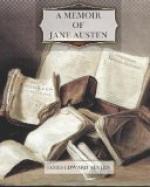The two next letters must have been written early in 1801, after the removal from Steventon had been decided on, but before it had taken place. They refer to the two brothers who were at sea, and give some idea of a kind of anxieties and uncertainties to which sisters are seldom subject in these days of peace, steamers, and electric telegraphs. At that time ships were often windbound or becalmed, or driven wide of their destination; and sometimes they had orders to alter their course for some secret service; not to mention the chance of conflict with a vessel of superior power—no improbable occurrence before the battle of Trafalgar. Information about relatives on board men-of-war was scarce and scanty, and often picked up by hearsay or chance means; and every scrap of intelligence was proportionably valuable:—
’MY DEAR CASSANDRA,
’I should not have thought it necessary to write to you so soon, but for the arrival of a letter from Charles to myself. It was written last Saturday from off the Start, and conveyed to Popham Lane by Captain Boyle, on his way to Midgham. He came from Lisbon in the “Endymion.” I will copy Charles’s account of his conjectures about Frank: “He has not seen my brother lately, nor does he expect to find him arrived, as he met Captain Inglis at Rhodes, going up to take command of the ‘Petrel,’ as he was coming down; but supposes he will arrive in less than a fortnight from this time, in some ship which is expected to reach England about that time with dispatches from Sir Ralph Abercrombie.” The event must show what sort of a conjuror Captain Boyle is. The “Endymion” has not been plagued with any more prizes. Charles spent three pleasant days in Lisbon.
’They were very well satisfied
with their royal passenger, {68} whom
they found jolly and affable, who
talks of Lady Augusta as his wife,
and seems much attached to her.
’When this letter was written, the “Endymion” was becalmed, but Charles hoped to reach Portsmouth by Monday or Tuesday. He received my letter, communicating our plans, before he left England; was much surprised, of course, but is quite reconciled to them, and means to come to Steventon once more while Steventon is ours.’
From a letter written later in the same year:—
’Charles has received 30_l_. for his share of the privateer, and expects 10_l_. more; but of what avail is it to take prizes if he lays out the produce in presents to his sisters? He has been buying gold chains and topaze crosses for us. He must be well scolded. The “Endymion” has already received orders for taking troops to Egypt, which I should not like at all if I did not trust to Charles being removed from her somehow or other before she sails. He knows nothing of his own destination, he says, but desires me to write directly, as the “Endymion” will probably sail in three or four days. He will receive my yesterday’s letter, and I shall write again by this post to thank and reproach him. We shall be unbearably fine.’




